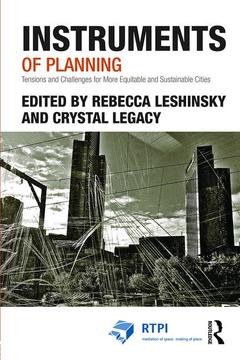Description
Instruments of Planning
Tensions and challenges for more equitable and sustainable cities
RTPI Library Series
Language: English
Subject for Instruments of Planning:
Keywords
planning process; planning practice; urban system; urban governance; sustainability; EPBC Act; Private Sector Development; Public Engagement; Maryland National Capital Park; Co-creation Methods; EPBC; Revolving Funds Programmes; Solution Nexus; Planning Instruments; Conservation Covenants; NSW Government; Nature Conservation Trust; Biodiversity Offset; Offset Scheme; Affordable Housing Targets; Biobanking Scheme; Green Infrastructure; SEIFA Index; UK Energy Policy; Policy Packaging; Infill Dwellings; Montgomery County; Affordable Housing Delivery; Biobank Site; Affordable Housing Outcomes
Publication date: 08-2015
· 15.6x23.4 cm · Paperback
Publication date: 08-2015
· 15.6x23.4 cm · Hardback
Description
/li>Contents
/li>Readership
/li>Biography
/li>
Instruments of Planning: Tensions and Challenges for more Equitable and Sustainable Cities critically explores planning?s instrumentality to deliver important social and environmental outcomes in neoliberal planning landscapes. Because each instrument is unique and may be tailored to its own jurisdictional needs, Instruments of Planning is a compendium of case studies from urban regions in Australia, Canada, the United States and Europe, providing readers with a collection that critically challenges the role and potential of planning instruments and instrumentality across a range of contexts.
Instruments of Planning captures the political, institutional, and economic challenges that confront planning. It examines planning instruments designed to assist with strategic planning and implementation, and considers the role that technology plays in unpacking and understanding complexity in planning.
Written by Rebecca Leshinsky and Crystal Legacy of RMIT University in Melbourne, Australia, this book fills the gap in planning theory about the instrumentality of planning in the neoliberal urban context. It is essential reading for students, urban researchers, policy analysts and planning practitioners.
1. Planning instruments and the urban change process Part 1. Planning challenges in a context of discontinuous growth 2. Towards equitable intensification: Restricting developer gain and compensating planning costs 3. Freedom’s prospect? Re-thinking red and green tape reform as a planning instrument 4. The problem/solution nexus and its effects on public consultation Part 2. Designing strategies for change 5. Community deliberation as a procedural planning tool: Examination of Vancouver and Melbourne 6. Targets for affordable housing: Supporting equitable and sustainable urban growth 7. Social impact assessment: Strategic litigation tool for planning law decision makers 8. A design-led approach for enabling collective imagining of sustainable urban futures Part 3. Instruments to implement change 9. Would you like a code with that? Place-based planning and mapping neighbourhood fields of care 10. Transferable development credits put growth in its place 11. Managing urban intensification through conservation covenants 12. Regenerating cities: Creating the opportunity for greyfield precinct infill development Part 4. Technology in planning: Supporting urban policy and decision-making 13. Policy and planning on the interface of socio-technical systems: Novel approaches to policy development 14. Engaging the greyfields: Community engagement and co-design in residential redevelopment of public housing 15. Technology in urban planning: Spatial hedonic house price model as an information tool 16. Instruments of planning: tensions and challenges for more equitable and sustainable cities
Rebecca Leshinsky is a Senior Lecturer in Property, School of Property, Construction and Project Management, RMIT University, Melbourne, Australia, and the author of a number of practitioner books in the areas of property and strata law.
Crystal Legacy is an Australian Research Council (DECRA) Fellow and a Vice Chancellor’s Research Fellow in the Centre for Urban Research at RMIT University. She is co-editor of Building Inclusive Cities: Women’s safety and the right to the city (Routledge).




